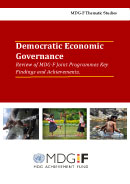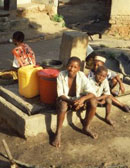

Gouvernance économique
 Ensure Environmental Sustainability
Ensure Environmental Sustainability
Good governance is an influential factor in achieving the MDGs.
In Bosnia & Herzegovina, the MDG-F directed US$1.25 million of investments in small infrastructure projects to increase water supply coverage. In Honduras, we leveraged nearly US$4 million from the Central American Economic Integration Bank for rural infrastructure, bringing water and sanitation to nearly 35,000 people. And in the Philippines, the government has agreed to provide $230,000 to develop water supply systems in each of the 36 municipalities served by MDG-F initiatives.
These efforts contribute directly to meeting the MDG target of halving the proportion of people without sustainable access to safe drinking water by 2015, one of the targets of MDG 7.
RESULTS OF OUR WORK:
- 440,000 citizens gained access to safe affordable drinking water.
- 31.7 million people improved their lives through 41 new laws, 78 policies and 157 plans to boost water and sanitation services.
- 669 community organizations and 665 local providers were strengthened or created to promote community empowerment and participation in water management.
Click here for a complete report of the indicators and results achieved by the MDG-F’s 11 joint programmes on Democratic Economic Governance.
Success Stories

Principaux résultats et réalisations
Ce rapport rend compte des principales réalisations et expériences des programmes du F-OMD au sein de ce volet thématique. Le rapport présente l’impact des programmes sur la vie des communautés des 5 régions où ils ont été mis en œuvre. Préparée par un expert indépendant, cette étude est fondée sur une revue documentaire, des entretiens avec plusieurs programmes conjoints, et une analyse et synthèse approfondies des apports et contributions des programmes conjoints.
| Résumé individuel | Rapport complet (en anglais) |

Democratic Economic Governance Database
Experiences and lessons learned from the MDG-Fund's 11 Joint Programmes have been gathered in a database to facilitate the sharing of knowledge about how to strengthen democratic economic governance in the water and sanitation sector. Among the areas explored are sector coordination, public participation, community management and model contracts.
|
Titre du Programme conjoint
Pays
F-OMD de programme
|
